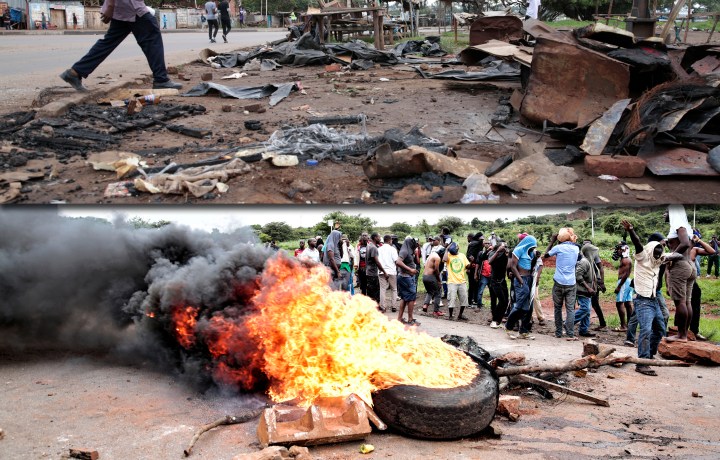ZIMBABWE chaos
Shot at, confused and dazed in the streets of Harare

A skinny teenager fears he will never be able to use his left leg again. It was shot at close range 10 days ago, outside his grandmother’s house in a poor, overcrowded suburb south of Harare. He presumes the army shot it, but says maybe it was the police.
The boy doesn’t know how he landed up at the state’s Harare hospital, as he woke up after an operation to remove the bullet. Maybe more then one, he is not sure. But surgeons had to slice down much of his leg from the knee, and he is still feeling pain. The dressing is around most of the leg.
His parents are both working in South Africa, and send cash home weekly, but his older sister did come up from Durban, South Africa’s main port city, to see him.
He did not even know why people were gathering in the streets outside the house he shares with relatives and others. He recalls getting an SMS earlier in the day saying people should stay at home and not go to work.
“I did not know why and I have no work. I didn’t know what was going on in the streets, that was Monday 14th, and I went to have a look and it was frightening, so I went to the gate at my grandmother’s house, and there was so much tear gas from the police, and there were people everywhere and shouting and then I was shot. But I didn’t know I was shot until after I woke up from the operation,” he says from a small private Harare hospital which has only 10 beds but has treated more then 300 in the first days after Zimbabwe’s police and army turned on protesters and shot and killed and wounded hundreds in several poor suburbs, mainly in Harare and the second city, Bulawayo.
Tawanda, who was advised by medical staff not to be identified, lives in Mbare, one of the oldest high-density towns built during the Rhodesian days when blacks had to live separately, and usually far from more lugubrious suburbs for whites.
Like many Zimbabweans in recent years, Tawanda can hardly speak any English as Zimbabwe’s education system has been on its knees for years.
Struggling to speak, and clearly traumatised from his injury and uncertainty about the future, he is wondering why he was shot and says he doesn’t know what will happen now.
In the same ward is an even more frail looking young man, Tonderai, also 19, who lost both parents when he was still a baby, and has been brought up by his oldest brother and other siblings in a western township, Budiriro. He didn’t know a stayaway had been called by the Zimbabwe Congress of Trade Unions to protest against the 150% fuel hike the night before.
He saw a mob protesting against the fuel price rise, during the early hours of the stayaway, and says some demonstrators were hurling stones and bottles around and then the police arrived and started throwing tear gas, and suddenly he realised he had been shot, near his right ankle. And he was bleeding.
His older brother, who he helps sells goods in the streets about four miles from their tiny home, saw what had happened and put his young sibling on his back and jogged home and then took him to a nearby municipal clinic, which called other donor-supported medical services who took him to the small hospital where he is now.
He had to have surgery to remove the bullet, and days later needed a second operation as the wound went septic. He too does not know what he will do in life as his birth was never registered and therefore he has no identification number.
“I don’t think I can ever study,” he said. “Because I don’t have an ID and I depend on my brothers.”
The medical supervisor at this clinic, which now has only a handful of injured from the first days of the protests, said the main Zimbabwe hospital, the Parirenyatwa, was unable to treat many who had been injured by the army and police.
“So many had limbs broken. Arms, legs, and bullets everywhere. The Parirenyatwa can’t operate. They did nothing. It is disgusting. It was many private doctors and doctors for human rights and others who did the operations. Not the state. The state is prosecuting many doctors at present because they went on strike about wages. Many doctors are involved in disciplinary hearings every day.”
He and others were all so cheered when Robert Mugabe was ousted from power by a coup d’etat in November 2017, but now says that optimism is gone.
“It’s like it was before. We are all scared. The police and army are violent. We are short of food, people are being abused, as in Mugabe days. (President) Emmerson Mnangagwa is just the same.”
Not far from this clinic, hundreds of people arrested in connection with the violence are on trial, and most are charged with incitement to commit violence or subversion. So far none has been granted bail and Zimbabwe Lawyers for Human Rights said the state is abusing the rule of law in its continuing legal procedures against about 700 people arrested since the anti-fuel hike protests on January 14.
Five Movement for Democratic Change MPs are in police cells, four in central Zimbabwe are being fast-tracked through magistrates’ courts for incitement and a Harare MP is still awaiting charges to be formalised.
Neither Mnangagwa’s spokesman, George Charamba, nor information permanent secretary Nick Mangwana would take calls or respond to emails for several days. And at their offices in central Harare on Thursday, Daily Maverick was told they were “in meetings”. DM

















 Become an Insider
Become an Insider